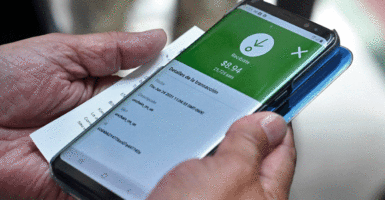El Salvador passed a new law last month that makes bitcoin national legal tender alongside the U.S. dollar. This means Salvadorans can pay their taxes in bitcoin and use it for any debt or purchase.
While this is the first time a country has made a cryptocurrency legal tender, El Salvador continues a long tradition of governments recognizing that currencies freely chosen by the people are often better than the government’s product.
Political leaders should return to that tradition by embracing innovations in currency, payments, and savings as a healthy check on government abuses and on weaknesses and inefficiencies in the systems we use today.
Impact on Salvadorans
El Salvador’s new law will place bitcoin on equal legal footing with the U.S. dollar, the country’s main currency since 2001. Bitcoin has long been legal in El Salvador and in the U.S., but never has it been placed on an equal legal footing. Bitcoin’s vague currency status is likely one reason so few businesses accept it today, despite fees now thousands of times lower than credit card fees.
While Bitcoin has a high-tech image, El Salvador’s law is meant to alleviate the country’s extreme poverty.
Today, about 70% of Salvadorans lack access to a bank account, yet overseas remittances make up 22% of El Salvador’s gross domestic product, which is comparable to the share of oil in Saudi Arabia’s national income. Most of those remittances—about 80%—are used for day-to-day living expenses in a country 17 times poorer than America.
This combination means millions of Salvadorans are exposed to fees of up to 20% by money transmitters. Those living in rural areas must travel at least six hours on winding back roads to the nearest town to collect their money, braving gangs that prey on vulnerable recipients, including the elderly.
So, for many Salvadorans, being able to receive and spend money directly from their phone with essentially zero fees can be a lifesaver.
Indeed, to protect such users from fees, El Salvador’s law contains a provision mandating that all stores accept bitcoin if the customer wants. The mandate effectively exempts small vendors who lack the technology. It also provides local bitcoin recipients who do not want to keep them free and instant convertibility to U.S. dollars.
Impact on the Rest of the World
For the wider world, El Salvador’s new law may serve as a model for introducing bitcoin and private currencies more broadly as legal tender.
Ever since the inflation that occurred in the 1970s, many economists have argued central banks cannot be trusted to protect the dollar. Until recently, advocates typically focused on either commodity backed currencies or privately issued bank money. However, Bitcoin now offers an option that is even less vulnerable to government seizure—a very real future possibility in countries such as El Salvador.
Other countries that might follow El Salvador include dollarized countries like Ecuador and Panama, and countries with high remittance use like Mexico, the Philippines, and most of Central America.
Countries already suffering high inflation, such as Argentina, Nigeria, and Turkey, would benefit the most from dual legal tender, whether in dollars or bitcoin. In all of these countries, bitcoin remains too volatile for most savings, but can offer long-term protection, especially against governments that habitually steal their citizens’ money, whether directly or via inflation.
For the U.S., the prospect of a country making bitcoin legal tender should raise discussion on several fronts among policymakers.
First, while Americans have not had to worry about high inflation rates for many years, recent inflation reports highlight the need to remain vigilant against rapidly rising price levels. Americans should have the same opportunity to protect their life savings from irresponsible central bankers as Salvadorans will soon have.
Second, American consumers and entrepreneurs have long been held hostage to an outdated and overregulated financial system. For years, crypto-based innovations in payments, smart contracts, and capital markets have lowered costs and improved options for customers.
For example, because there is no middleman, bitcoin payments now feature lower fees or zero monthly fees, no minimums balances, and no extra charges. These benefits are precisely what drove El Salvador’s new law.
Third, America’s manufacturers and exporters could fall behind competitors as other countries adopt innovative technologies used in the production of exports that also influence a substantial part of the economy.
Impact on the US Dollar
Some worry that bitcoin could displace the U.S. dollar’s reserve status. In fact, today bitcoin is far too small, sporting a market capitalization comparable to the Thai baht. This is not likely to change unless the Federal Reserve substantially erodes Americans’ confidence in the dollar.
It is important to remember why we have a dollar in the first place—to benefit the American people. Every time you sell a dollar for groceries, a house, or Ford stock, it makes the dollar slightly weaker. We do not ban grocery stores or investing because dollars serve the American people. The people do not serve the dollar.
In the unlikely event the Fed does substantially erode confidence, our priority should be to protect the American people, not officials at the Fed. Bitcoin, like nongovernment currencies before it, is an insurance policy in the sense that it is irrelevant if you do not need it, and a lifesaver if you do.
All Americans should celebrate and support innovations that can benefit us, whether from Canada, El Salvador, or anywhere in between. Above all, regulators and policymakers should not strangle innovation in the crib on behalf of lobbyists. They should support innovations that help and protect the American people they swore to serve.
The Daily Signal publishes a variety of perspectives. Nothing written here is to be construed as representing the views of The Heritage Foundation.
Have an opinion about this article? To sound off, please email letters@DailySignal.com and we’ll consider publishing your edited remarks in our regular “We Hear You” feature. Remember to include the URL or headline of the article plus your name and town and/or state.































